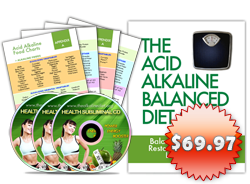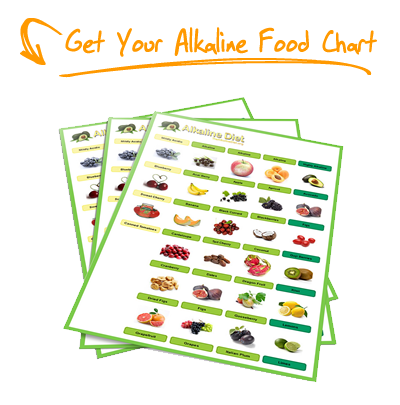Stomach Acid Truths, Myths and Remedies
Posted on 08. Dec, 2010 by Staff Writer Candy Del Carmen in Alkaline Diet Tips, Blog
 There are so many misconceptions hurling around the diet corner regarding the debate on whether foods can affect the acid alkaline level of the body. There are some people who have stomach acid which only take antacid medication. However, others believe in alkaline diet proponents who are recommending a healthy lifestyle and proper alkaline diet which are the best options to overcome an acidic stomach.
There are so many misconceptions hurling around the diet corner regarding the debate on whether foods can affect the acid alkaline level of the body. There are some people who have stomach acid which only take antacid medication. However, others believe in alkaline diet proponents who are recommending a healthy lifestyle and proper alkaline diet which are the best options to overcome an acidic stomach.
On the contrary, there are also claims that an acid/alkaline theory is purely nonsense because according to some critics, no matter how acidic or alkaline a certain food could be, it cannot change the alkaline/acid level of the urine.
Anything that leaves the stomach becomes acidic due to its acidic environment. After foods leave the stomach and enter the intestines whereas secretions from the pancreas neutralize the acid, then it becomes alkaline. No food can change the process but instead, it is our kidneys and lungs that are the chief responsible in maintaining the pH of our blood and body. With that regard, this piece of article will shed light to our valued readers how a certain food can affect the acid and alkalinity of our body.
What is stomach acid?
If we will go back to digestion process, all foods we consume need to break down into usable body nutrients and the whole process always starts in the stomach which secretes an acid in order to digest foods. It is actually the cells which is called oxyntic cells or parietal cells which is responsible in excreting stomach acid and raises the acidity level in the stomach which can denature the proteins in food.
Secretion of acid or known as gastric acid in this case is necessary. It plays as our protective mechanisms in our stomach and the intestine that are responsible to balance the acid levels. The acid consists of hydrochloric acid with enough content of potassium chloride as well as sodium chloride. The normal acid has a pH level of 1-2 and can go higher during digestion process. The stomach acid has to work together with the enzymes so that the nourishment can be fully utilized which aids our body to function accordingly.
Another important function of stomach acid is its vital action to safeguard our immune system against harmful bacteria which we are getting from the foods we eat. An acidic environment can kill harmful bacteria and other forms of microorganisms. Therefore, people with low stomach acid production can be subjected to beset by harmful bacteria and micro-organisms.
What is the implication of excessive production of stomach acid?
Given the fact that stomach acid has to be secreted for proper digestion, however, since the acid is so strong and the undiluted materials can be burned like a burning wood which can affect the lining of the stomach. So, when the stomach produces excessive acid, this is where a certain condition may experience such as heartburn, dyspepsia (feeling of fullness and nausea), non-ulcer dyspepsia, duodenal ulcer, gastric ulcer, and acid reflux.
Excess stomach maybe rooted from several factors. Eating too much causes stomach acid production and to counteract the negative effect of consuming big meals, you may start eating small amount of food to lessen the secretion of acid during digestion. High fat meals such as meat can also trigger so much acid in stomach because these types of food are stored in the stomach longer before our digestive tract can fully digest them and eliminate.
How alkaline diet can help to reduce the excess acid in stomach?
The most holistic approach to reduce excess acid in stomach is through alkaline diet. Proponents of alkaline diet recommend that our nutrition can directly affect the acid alkaline level of our body. For those people who are not aware of the terms alkaline and acid, let us draw a demarcation line between the two. An acid is the substance which releases hydrogen into a certain solution (the blood, body fluid, etc). While on the other hand, an alkaline is the one which removes the hydrogen from a solution. When we try to measure the scale of hydrogen from 1-14, this is what we called pH level. It denotes the exact measure or level of an alkaline and acid. If your pH level is below 7, that is considered an acidic whereas 7 and above is considered alkaline.
During the digestion process, the acid alkaline balance of our body is greatly affected with the secretions of the pancreas and stomach which is also absorbed into the bloodstream. Again, after the consumption of food, the stomach has to secrete the hydrochloric acid and the pancreas has to secrete bicarbonate that can neutralize the gastric acid so the so called pancreatic enzymes can work well. In order to reduce the acid reflux, a proper diet has to be taken into consideration.
Choosing highly alkaline foods, you may not worry anymore regarding the excessive production of the stomach acid. Moreover, keeping your body in alkaline level can help you to protect the immune system against simple colds, flue and other illnesses.
How to classify alkaline/acid foods?
To classify an acidic food, we have to remember that any food that increases the acidity of our urine after the consumption is classified as acid forming food. Vice versa if the food we consume increases the alkalinity of the urine, and then it is classified as alkaline forming food. One thing that needs a clarification is that the effect of certain foods in urine does not have to do with the pH level of the food itself. Like for example, lemon is considered a highly acidic food base on its citrus acid content. Nevertheless, after being metabolized, lemon will become alkaline. So, lemon is considered as highly alkaline food on the contrary to its nature.
You may want to ask what are considered acid forming foods, here are the list for your reference: corn, most grains, fish, meat organ meats such as organ, eggs, gravy, processed foods, wine, yogurt with active cultures, buttermilk, sour cream, fermented foods, aged cheese, vitamin B complex, hydrochloric acid supplements, and soft water, coffee, plums, prunes, and cranberries.
On the other hand, alkaline forming foods are as follows: fruits not mentioned above such bananas, lemons, and watermelon, dandelion greens, figs, barley, alfalfa sprouts, broccoli, cucumber, kale, parsley, sea vegetables and grasses such as wheatgrass.
How to know if you have an excess stomach acid?
To know if your stomach has too much acid, a doctor may perform a stomach acid test. The process is done after not eating for a certain period of time wherein all the fluid dominated and remained in the stomach. Then inserting a food pipe, the fluid is removed to test the ability of cells and the acidity level around the stomach and carefully examined. Another process to test the acid stomach is through insulin-induced hypoglucemia, whereas, the insulin is injected through a vein or under the skin. The process will definitely cause the blood sugar to decrease and to enable the vagus nerve
(part of the brain stem that wanders down to the colon) to stimulate the discharge of gastric. Then after a short period of time, sample stomach contents are being analyzed.
If you wonder why certain procedure has to be conducted, there are some possible reasons why. First, it is necessary to check if people suffering from ulcer are responding to anti-ulcer medications given to them. Another reason is to check if the stomach material is coming back up which comes from the small intestine. Likewise, the stomach acid test is also done to further evaluate the possible cause of not absorbing the nutrients from the intestines. Lastly, checking the acidity level in stomach can determine the main cause of ulcer.
It is worth taking a note that from the results that would come up from the stomach acid test, doctors can draw possible prognosis such as:
- If a person has decreased level of stomach acid, it may cause the malabsorption of important nutrients that our body needs.
- If a person has increased level of stomach acid, it may lead to certain type of ulcer like Zollinger-Ellison syndrome. ZES is a rare disorder of tumors appeared in the pancreas of duodenum which may cause the stomach to produce excess acid leading to peptic ulcers. The tumors can spread to some other areas of the body which can be cancerous and deadly.
- If a person is found to have the presence of bile in his or her stomach, it may indicate that the stomach material is backing up coming from the small intestine. This is a usual case to patients who underwent a partial gastrectomy. The operation involves removal of some part or the whole part of the stomach performed to patients who have cancer of the stomach, gastric ulcer, or hole in the stomach wall.





Recent Comments